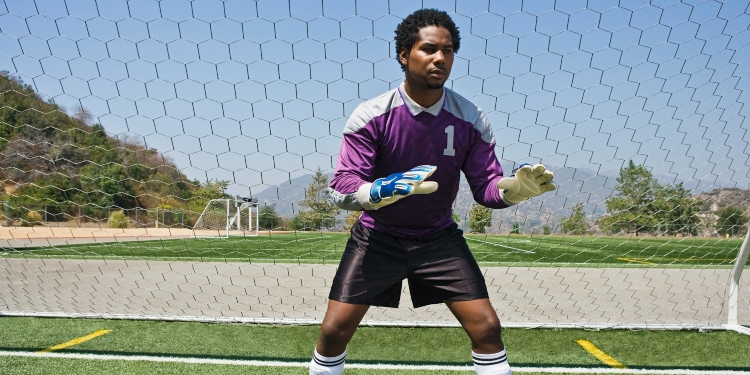Every goalie needs a good set of goalkeeper gloves. But that’s not the only piece of goalkeeping equipment you might decide to invest in. From finger tape to glove bags, there are several more essential accessories to add to your keeping kit.
Let’s see a few examples, and ascertain which are worth buying.
A Glove Bag
When buying any set of goalkeeper gloves, many experts also recommend a glove bag to store them in.
This might not seem like the most essential purchase, particularly for younger or more inexperienced keepers. But glove bags bring much to the table. They offer a safe, dry, cosy space to keep your goalie gloves safe, whenever they’re not in use.
Gloves look tough and study on the outside. But it may surprise you to learn that they’re not necessarily as strong as they seem. Rain, mud, sunlight – it all takes a toll on the latex layers of gloves, leading to cracks and other problems.
By keeping your gloves in a bag while travelling to and from games or training, they should last a lot longer.
Glove Wash
It’s important to clean your goalkeeper gloves often. In fact, experts say to do it after every game and training session. Even if the gloves don’t look too muddy or dirty, or you haven’t had to make many saves, it’s always worth giving them a wash.
Usually, warm water and a bit of elbow grease is all you need to rub away dirt and mud. But, now and then, you might like to give your gloves a deeper clean. That’s where glove wash or glove cleaning sprays and solutions come into play.
Unlike harsh chemical cleaners and detergents, special glove wash products are made to be gentle yet effective on goalkeeper gloves. They keep the latex clean and maintain the grip, helping you get more from your gloves for longer.
Glove Spray
Known by several other names, like grip boost, grip spray, or even “glove glue,” glove spray is, for many, another must-have keeping essential.
This spray activates the latex layer of the gloves, improving their grip. That means easier catches and holds of the ball, with less risk of fumbles and slips. There are even some sprays designed for wet weather games, helping you keep hold of a slippery, rain-soaked ball.
So, if you feel like you’re fumbling often, or your gloves don’t grip as well as they should, spray might be the solution. It’s not necessarily a must-have. But it definitely adds value, especially on older gloves that aren’t as effective as they once were.
Cleaning Sponge
Usually, you’ll just use your fingers with warm water to rub away dirt or mud from your goalkeeper gloves. However, for deeper and more thorough cleans, you may prefer a cleaning tool, like a sponge.
Harsh, bristly brushes and rough sponges aren’t great to use on goalkeeper gloves and can actually do more harm than good. But a specialist cleaning sponge has just the right level of softness to help clean away dirt without doing damage.
Again, we can’t call this a must-have or 100% essential item, but it’s not a bad one to have in your cleaning kit, especially if you find that cleaning your gloves by hand takes a lot of time and effort.
Wrist and Finger Tape
Last up, two final items that help you stay safer on the pitch: wrist tape and finger tape.
When people think about football injuries, they tend to focus on outfield players and all the sprains, fractures, hamstring tears, and terrible bone breaks they may suffer. However, goalies are equally at risk of getting hurt when jumping, diving, and colliding with other players in their quest to keep a clean sheet.
Finger hyperextensions, wrist strains – these are just a couple of hand injuries goalies may incur. Wrist and finger tapes guard against them. You just wrap the tape around your hands. It acts as both a shield and stability booster, minimising your odds of injury.
Expand Your Goalkeeping Arsenal
If you want to be the best keeper you can be, you can’t rely on talent alone. Invest in the best equipment and enjoy all the benefits, like reduced risk of injury, greater grip in your gloves, and stronger performance on the pitch.
David Prior
David Prior is the editor of Today News, responsible for the overall editorial strategy. He is an NCTJ-qualified journalist with over 20 years’ experience, and is also editor of the award-winning hyperlocal news title Altrincham Today. His LinkedIn profile is here.












































































